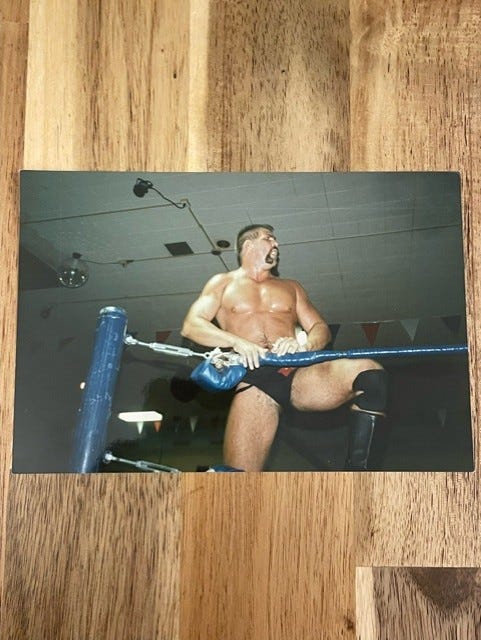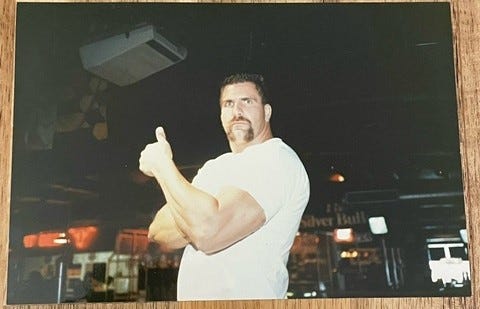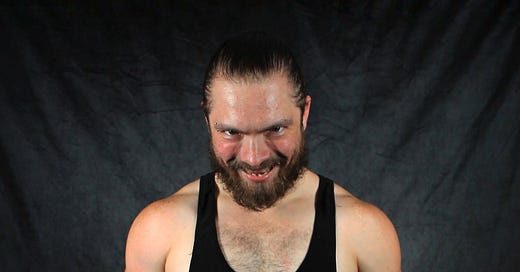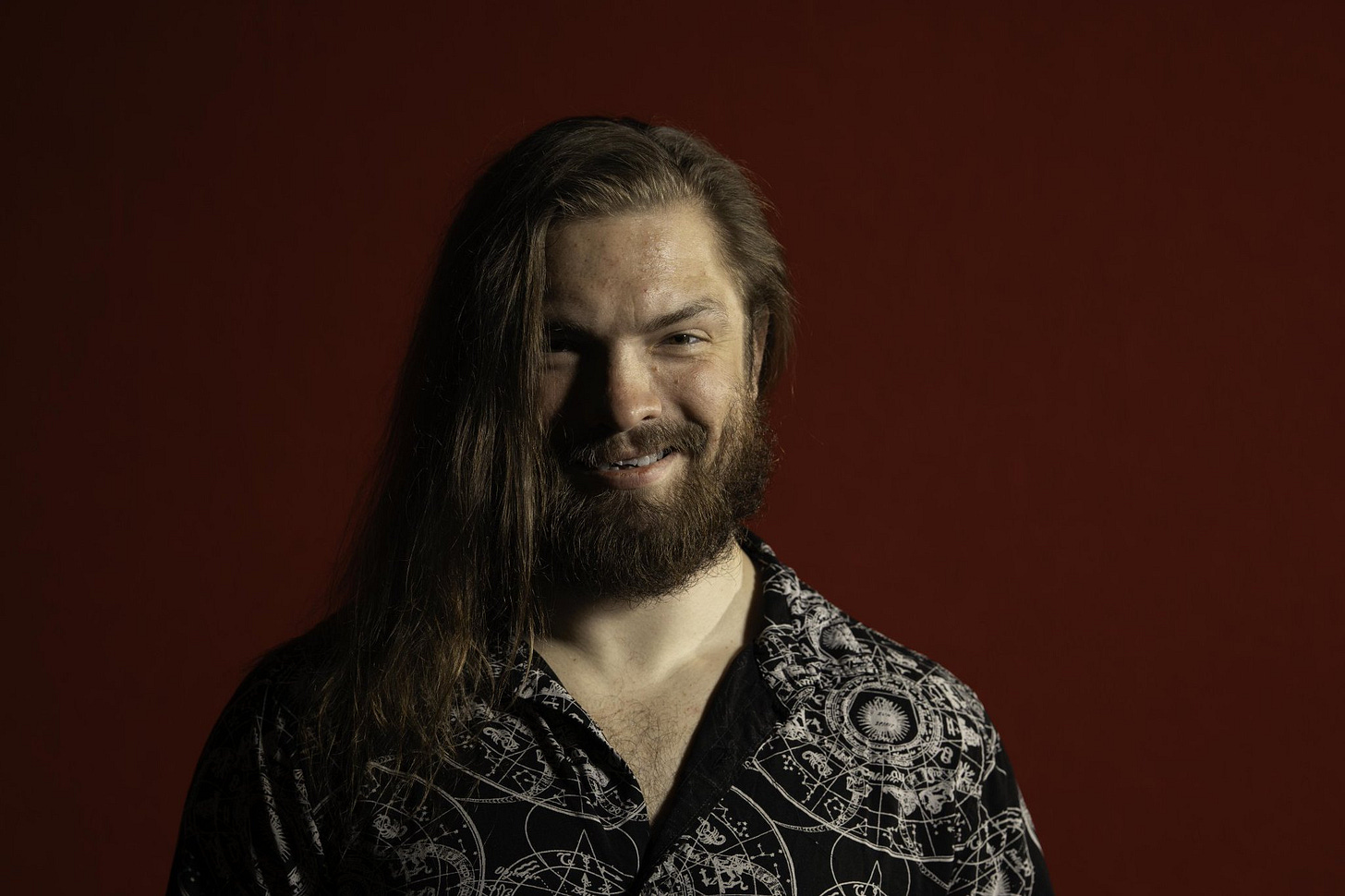
I watch a lot of independent pro wrestling on a monthly basis, and I enjoy it tremendously.
I like discovering new wrestlers as a viewer who haven’t been on WWE or AEW TV or known to any degree by mainstream pro wrestling viewers.
These pro wrestlers that I’m “discovering” are talented, entertaining, and they are fresh to me as a viewer. They haven’t gotten that first significant “break” yet.
I emphasize the word yet.
It’s an exciting feeling to me as a wrestling fan to find new wrestlers whose work I enjoy, to follow their careers, watch their matches regularly, and root for them in their aspirations to reach a higher level in the world of professional wrestling.
Every month I’m adding independent wrestlers to a list that I keep of talent that I want to see more matches of and that I want to make other wrestling fans more aware of too.
The independent wrestling scenes in the United States, Canada and UK are full of tremendously talented wrestlers in terms of in-ring work and speaking ability on the mic, and many whom combine both at a very high level.
It’s a fallacy to think the quality of independent wrestling itself is at a lower level just because it’s an independent wrestling promotion. I’ve watched so many independent wrestlers in the last month who through their matches and mic segments are talent-wise capable of being in WWE or AEW right now and would do well if given a chance.
There’s a lot of others too I’ve seen that I would put into the category of having great potential. Perhaps they are newer to being a wrestler and maybe in the first year or two of their careers. However, even at an early stage, they show signs of potential greatness to reach a higher level one day and be stars in either WWE or AEW.
What else do I enjoy about independent wrestling besides discovering new and outstanding talent to enjoy?
I like watching shows that take place in an intimate setting.
It’s a much different experience from watching WWE and AEW, and I enjoy watching the “big leagues” too.
In particular, I like watching wrestling shows that take place in front of very large audiences and watching a huge number of fans reacting to something in unison is very captivating to me as a viewer. I can find the general spectacle of a large event is lot of fun to watch. I trace that back to WrestleMania III. My lasting memory of watching that event on PPV is the entrances to the opening match, when all the lights were on in the venue, and the sheer enormity of the audience the way everything was filmed.
However, there’s something really special to me about seeing a wrestling as a viewer in a smaller setting like on most independent shows, whether it’s watching it on my television, my computer, or seeing it live.
For one thing, there’s a lot of crowd interaction. The wrestlers yell at the audience, and the audience members yell back. The two parties acknowledge each other. It feels very personalized and interactive.
Attending independent shows is an experience as well in itself, and I highly recommend it if you’ve never done so.
Besides the high-quality matches and a lot of hardworking talent you’re likely going to find, you’re also going to be very close to the ring. For many of us, we will be closer than we’ve ever been before at a show with a major promotion and at a much lower price.
Regarding the current scene of independent promotions, there’s a lot of high-quality promotions out there.
They do a very good all-around job presenting their product.
They have storylines that carry from show to show.
They have champions, factions, good camera work and quality commentators.
Most of the best ones remind me a lot of the footage I’ve watched of certain territory promotions that had weekly TV shows back in the early 80s when those thrived.
(I recently acquired from a private collector a copy of a very large amount of ‘80s era TV show footage from a territory pro wrestling promotion and have been able to watch fully intact territory era promotion TV episodes. There’s a fascinating story behind how all the footage came to be available, and it will be the subject of an upcoming post. It involves a well-known ‘80s pro wrestling name who has since passed away.)
A few independent wrestling promotions I recommend are Wrestling Open in Massachusetts, Limitless Wrestling in Maine and MCW in Maryland.
Readers are welcome to send me a Chat message here on Substack for more recommendations on promotion in your general area.

THE ROOTS OF INDEPENDENT WRESTLING
I was captivated by independent wrestling and the concept of it when I first saw an independent wrestling show in 1989.
At that time, the concept of a standalone independent wrestling show was largely new, and especially the concept of an independent show with a former TV wrestling star on the card being featured in the main event.
The first independent show I went to had Nikita Koloff in the main event and Sam Houston (the younger brother of Jake “The Snake” Roberts) in the co-main event, and both had very recently been on NWA TV shows.
The territory system of regional, full-time operating promotions was only a few years removed from having disappeared at that time, and independent promotions were largely struggling to draw fans back then and find their footing. This would all change within a few years.

By the mid-90s, the independent pro wrestling scene in the United States would be vibrant.
The promotions of the mid-90s carved an identity and a fan base by running both regular shows and developing rosters of local wrestlers, as well as implementing light storylines and feuds as part of the shows.
Back in the early 90s, the only chance it seemed for most independent shows to make a profit enough to survive was to load the card with local wrestlers. Most of them did not have too much experience and often had varying degrees of skill. Some of them were trained formally, and some were not.
The common thread back then was usually most of the local wrestlers were willing to work either for free in the name of gaining experience or only charge a relatively small fee. Then what the promoters would do is spend most of the show budget on bringing in a name wrestler or a legend.
If it was a name wrestler, it would be someone very fresh off WWF or WCW TV. They would book them into the main event and have them wrestle one of the local star wrestlers. The idea there was that they would sell more tickets by having a wrestler that was fresh off TV headlining the card.
The independent promoters back then were trying to fill the gap left by the whole disappearance of territory promotions with full-time rosters, week-to-week cohesive storylines, and locally broadcast television shows.
So, the independent promotions of the early 90s, when I first got into it as a fan, weren’t really promotions at all in the traditional sense of the word.
I speak this from living it, not just as a fan, but also writing for pro wrestling magazines in the early 90s, profiling a lot of what would now be defined as independent wrestlers.
I got many of them their initial publicity in national newsstand magazines because I thought they were talented and had potential to reach WWF or WCW, the two major promotions of the era when I was a pro wrestling magazine writer.
I wrote about two of them that I met and wrote about, Rasta The Voodoo Mon and Louie Spicolli, in earlier posts:
The Rasta The Voodoo Mon Story
The wrestling magazines largely died around 1993, as print media began to show the first signs of struggling, even years before the internet became a factor. I then transitioned to becoming a pro wrestling referee.
As a referee, I worked on the independent pro wrestling circuit for much of the rest of the decade.
Independent promotions of the early 90s would often just be one-off shows. Many of these promotions, if you could call them that, they only ran one or two shows and no more.
Then somebody else would come into the same area, run one or two more shows, and if they drew, they might run a few more, or they might never promote again.
This was much different than the heyday of the territory system of the 60s, 70s, and 80s, before independent wrestling became prominent.
By territory, sense, I mean a region typically covering multiple states, where a promotion ran shows in mainly small towns, but usually at least one city, often at the same venue from week to week.
These promotions also had a TV show that aired on a local station too. The idea with the TV show was that it was designed to get fans interested in buying tickets to see live events.
This in brief summed up the operating model of the vast majority of professional wrestling promotions in the U.S largely from the early 60s into the 80s.
WWE went national in the mid-80s, and that changed the face of professional wrestling in the United States.
A pro wrestler in the late 70s/early 80s WWE, called WWWF at the time, certainly wouldn’t have ever thought that the promotion they were wrestling for, a regional operation that promoted just in the northeastern part of the United States, would change the entire landscape of professional wrestling in the United States in a decade.
Many wrestlers in the transition out of the territory system were not able to find viable full-time work outside of WWE and NWA and a select few other promotions.
The end of the territory system and the roots of the path to a widespread independent wrestling scene in the United States are connected to WWE.
The very promotional force responsible for decimating and moving along the collapse of the territory wrestling system is in many ways primarily responsible for the beginning of independent wrestling as we know it.
The path begins when the son of the promoter, who is known to fans as a TV commentator, buys the promotion from his father in 1982.
The son will change the name of the promotion shortly thereafter from WWWF to WWF, later to become WWE a decade and a half later.
This promotion will proceed to single-handedly decimate the territory system, and this will usher in a new era where this promotion will ultimately reign supreme and for the most part never have a serious competitor in the world of professional wrestling.
The new owner will do this through a combination of signing top talent from each territory, essentially gutting the rosters, running the same towns with a more loaded talent roster, and securing the local TV slots away from the local wrestling promotions.
The commentator’s name, the person who will do all this, is Vince McMahon, Jr.
That’s a whole other story, though, so sure to subscribe to The Pro Wrestling Exuberant here on Substack to read more about the colorful history of professional wrestling.
FEATURED INDEPENDENT WRESTLER: REVOLVER ALEX REIMAN
ReVolVer Alex Reiman is the independent wrestler I’m featuring here who I recommend you seek out and watch some of his matches online.
He’s the current champion of Pro Wresting Magic, a first-rate independent promotion that is based out of New Jersey.
Reiman has a commanding presence about him when he walks out to the ring.
It grabbed my attention the first time I saw him, which was in a match at Pro Wrestling Magic’s Doomsday event last October against Ricky Pryce.
What I first noticed about Rieman was his methodical, confident, deliberate gait in the way he walked to the ring. There was this slight smirk on his face that added a lot to his presentation. The fans cheered him, but the guy looked unhinged like he would snap at any time.
I had never seen Rieman wrestle before, but he had my attention right away, and I was curious to watch his match and see what he would bring to the ring. That’s the effect a wrestler should have on a new viewer.
I immediately saw elements of Cactus Jack from the early 90s in Rieman’s general aura as he walked to the ring.
In the match itself, I liked how Rieman moved in the ring. It was methodical but deliberate, no-nonsense, and it matched the vibe he gave off as he came to the ring that he could explode in anger at any time. He came off as calm yet threatening at the same time, and that’s not easy to do.
Everything was purposeful that he did in the match and with little nuances added when he applied a basic hold. For example, when he did a headlock on the mat, he didn’t just sit there and jaw to the crowd. but he grinded he headlock a little bit for extra emphasis, and his facial expressions helped enhance the intensity of the moment.
His finisher was the Death Valley Driver, and it was done with impact.
His wrestling style as a whole was very methodical, but in an intense way to watch and whenever Rieman delivered a move, it had impact, and everything meant more as a result to me as a viewer.
ALEX REIMAN ON ALEX REIMAN
Here’s some more about Alex Reiman in his own words:
On what inspired him to become a pro wrestler:
I grew up as a lifelong wrestling fan and made up my mind when I was 4 to be a pro wrestler. What hooked me was my father showing me an old VHS tape of Curt Hennig vs Nick Bockwinkel from AWA. I debuted [as a pro wrestler myself] in February of 2014 for ECPW.
On what has been his most memorable match as a pro wrestler so far that he recommends to readers, and why:
The most memorable match of my career was vs Dan Maff in a dog collar match [in 2023] at Pro Wrestling Magic’s Kingdom Come. It’s available on IWTV. That match and rivalry as a whole truly made me find myself in the ring. The confidence you mentioned you see when I wrestle came from that feud and match as a whole.
On describing his wrestling style to someone who has never seen one of his matches:
My wrestling style is incredibly manipulative. Wrestling is a chess match. I study my opponents. Look for their weakness and exploit it. I look to beat my opponents both mentally and physically.
On the goals he has set for him that he’d like to achieve in the next few years:
In the next few years, I’d like… no, I need to wrestle full time. I want this to be how I provide for my family. I’d also like to travel more. I’ve been to Germany and Canada three times a piece and did a tour of England and also worked in the Netherlands.
On the promotions readers can seek out to see him wrestle in the coming months:
The promotions I do most of my work at are Pro Wrestling Magic, ISPW, and ECPW, all based out of New Jersey.
* Follow me on Bluesky for more pro wrestling content.
* I’m looking for other writers who are interested in collaborating with me on some pro wrestling writing post ideas I have:
Other pro wrestling writers
Writers who are fans of pro wrestling but have never written about it.
Writers who are curious about pro wrestling but have never watched it.
Send me a direct message on Chat on Substackif you’re interested.





Great article! I love the "Why I Like or Love ____" type of posts and this one is a gem. Good job, my friend